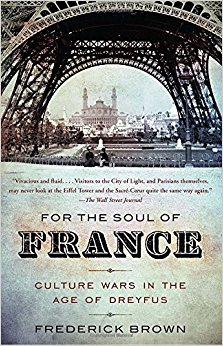 Sometimes it feels like it is hard to write engaging history books for any era that predates the 20th century. There is less cultural context for the modern reader: so much has changed that it makes it hard to imagine events, nevermind relate to them. Plus more details have been erased by the sands of time, so often the level of generality goes up. Brown does a good job getting around this. He uses a lot of newspapers and personal letters to give the reader primary sources to relate to: what people were actually writing and reading at the time. He often uses the universal expositions, which happened approximately every decade, to anchor things in time.
Sometimes it feels like it is hard to write engaging history books for any era that predates the 20th century. There is less cultural context for the modern reader: so much has changed that it makes it hard to imagine events, nevermind relate to them. Plus more details have been erased by the sands of time, so often the level of generality goes up. Brown does a good job getting around this. He uses a lot of newspapers and personal letters to give the reader primary sources to relate to: what people were actually writing and reading at the time. He often uses the universal expositions, which happened approximately every decade, to anchor things in time.
Based on the presence of “Dreyfus” in the title, I was expecting this to be more directly about anti-Semitism. The primary theme of the book is Catholic-Royalist versus Republican-Enlightenment, and anti-semitism only appears to the extent it is part of that broader conflict. For the first two-third of the book I was like “When does Dreyfus show up? When does Dreyfus show up?” but it was all engrossing enough that I didn’t mind too much. If I were the editor, I would have subtitled this something like “Eiffel, Dreyfus, Boulangism, and the fin-de-siecle culture wars in France” or something that indicates its broader scope. I think if my expectations were set properly at the start, I would have enjoyed the book even more.
As someone raised Irish Catholic in the United States, I grew up hearing about the Catholic Church as the representative of the little guy, especially the poor. So it was a surprise for me to read here about how, in nineteenth century France, Catholicism was strongly aligned with the aristocracy, in particular that a “natural order” would have a king in charge, as opposed to the atheistic Republicans. The overthrow of the king in the Revolution was like a national sin that had to be expunged, probably though a strong leader who would end the Republic and restore “natural” hierarchy. This was a pervasive theme: conflicts between Catholic preachers and secular teachers; the place of militant national leaders like Georges Boulanger that had echoes of royalism.
The Dreyfus affair, which I only vaguely had a sense of before, was pretty consistent with my understanding of anti-Semitism in Europe: the Jews were often financiers who worked in cooperation with the aristocracy on various large-scale projects (wars, railroads). If and when those projects failed, more often due to the incompetence of the aristocrats running them, the Jews were often thrown under the bus to avoid a financial crisis and/or repayment. Paul Johnson’s A History of the Jews is also a riveting read and goes into that dynamic in more detail. Brown’s chapter on the Union Generale debacle shows this more directly than the one on Dreyfus; it sort of seems like the wave of anti-Jewish resentment starts at the aristocratic level with the Union Generale and radiates outward so that the Jews become an all-out scapegoat for France’s own national failings, above all the devastating loss of Alsace 1871 after the Franco-German War.
In 2017, this book was resonant in terms of describing a battle for enlightenment ideals. Twenty-first century America is of course quite different from nineteenth century France, but certainly the battle lines often look similar: national ethnic identity versus ideals of human equality. When I walk through my neighborhood now and see “No matter where you are from, we’re glad you’re our neighbor” signs, I now think of Emile Zola. Trump feels a little bit like Boulanger, albeit minus all the military panache. It feels relevant, if only to normalize or universalize what the United States is going through now.
Final nitpick: Mr. Brown could dial it back a little with the twenty dollar words (““Do not be tempted by a twenty-dollar word when there is a ten-center handy, ready and able.” –Strunck and White). It’s a humanities book, so you get some leeway; but I think I have a pretty advanced vocabulary and I was looking up a word almost every other page, many of which were archaic, and there were some oddball phrases that seemed maybe British. A reason to read Kindle, so you can look them up easily.
Leave a Reply